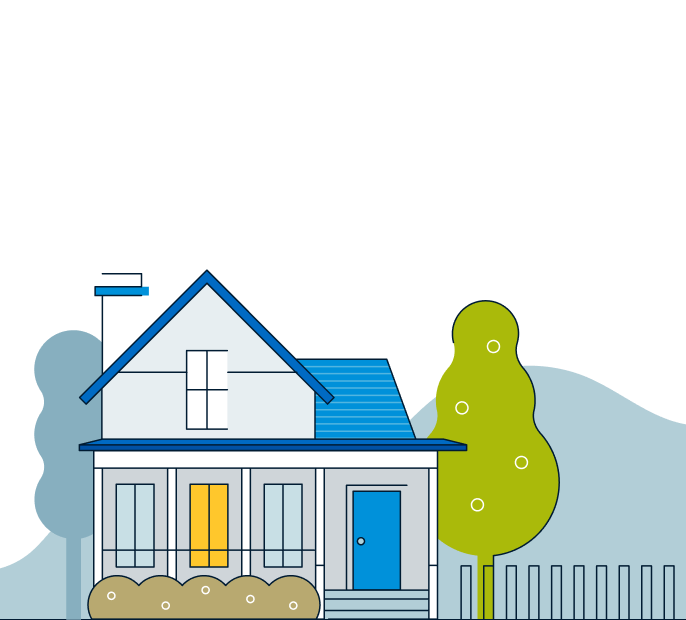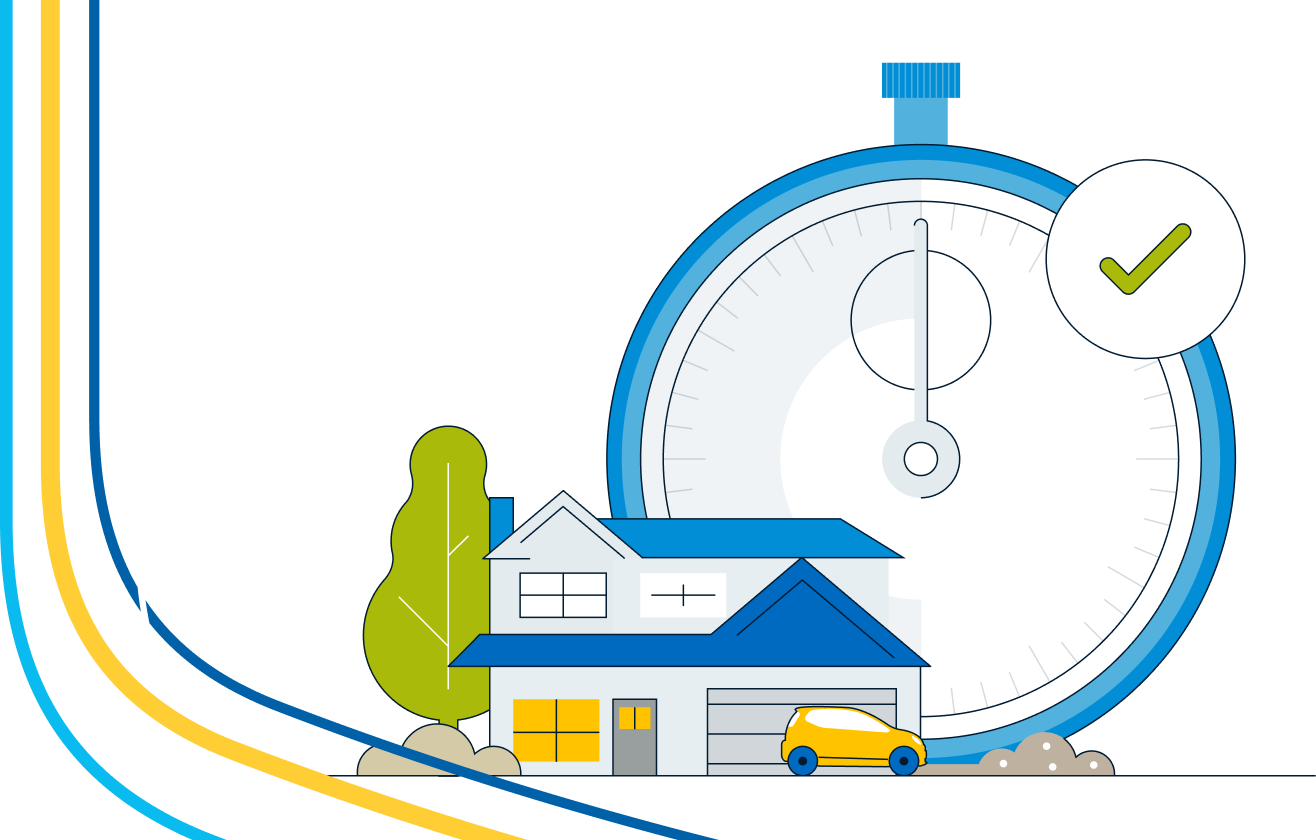Renewing Your Mortgage in RBC Online Banking
Renewing Your Mortgage in the RBC Mobile app
If your mortgage is eligible, you will see a message on your Accounts Summary page. Simply click the message and you'll be taken to the RBC Mortgage Renewal Tool.
If this option is available for your mortgage, you will see a message on your Accounts Overview screen. Tap the message and you'll be taken to the RBC Mortgage Renewal Tool.
By using the RBC Mortgage Renewal Tool, you can explore your options and complete your renewal online at your convenience.
Don't see a mortgage renewal message?
Please call 1-866-881-8453 and an RBC Advisor will be happy to assist you with your mortgage renewal.
What is a Mortgage Renewal?
In Canada, the time that it takes to repay your mortgage in full is typically divided into multiple terms. At the end of each term, you may need to renew your mortgage – choosing a new term includes the interest type, and length of time the new interest rate will be in effect. Renewing your mortgage is an opportunity to review your needs and make changes to your mortgage product, term length or other features.
Mortgage Renewal Tips and Advice
Find out more about the expert advice, easy renewal options, and rate guarantees available to you.
Understanding Mortgage Renewal Rates
Learn some basic mortgage concepts to help you make an informed decision about your mortgage terms.
Mortgage Renewal Tips and Advice
Find out more about the expert advice, easy renewal options, and rate guarantees available to you.
Learn More about Mortgage Renewal Tips and AdviceUnderstanding Mortgage Renewal Rates
Learn some basic mortgage concepts to help you make an informed decision about your mortgage terms.
Learn More about Understanding Mortgage Renewal RatesDon't have YouTube access?
What you need to know about…
Renewing Your Fixed Rate Mortgage
Discover some steps you can do now that can help lower your future mortgage payment and manage your cash flow.
Learn moreWhat you need to know about…
Renewing Your Variable Rate Mortgage
Has your variable rate mortgage been affected by fluctuating interest rates? Find out what you can do now to lower the impact of changing rates at renewal.
Learn moreDon't have YouTube access?
Renewing Your Fixed Rate Mortgage
In this video, we're going to talk about what happens to your mortgage payments when you renew your fixed rate mortgage during a time when interest rates are rising. And, we'll cover some of the options you have for managing those payments. First, let's talk about what happens when you renew your mortgage. Your mortgage comes up for renewal when your mortgage term ends. The term refers to how long your rate is set for. Amortization, which is another part of your mortgage, is the total length of time it takes to pay off your mortgage in full. Say you originally chose a 5 year term and 25 year amortization. When your mortgage first comes up for renewal at the end of 5 years, there would be 20 years left on the amortization. At renewal, you will choose a new term at mortgage rates available at that time. This term, along with your new rate, mortgage balance and remaining amortization are all used to calculate your new payment amount. Now, if your mortgage is coming up for renewal in a rising interest rate environment, your new mortgage payment could be higher than what you pay now. How much higher will depend on a few factors but some of the key ones include: Your current mortgage type - whether it is fixed or variable And your new interest rate. When you have a fixed rate mortgage, the higher payment could be due to the higher interest rate you are renewing at, compared to the interest rate you had before your renewal. Let's look at an example where you start with a $478,000 mortgage and a 25 year amortization. After 5 years, your fixed rate increases from 2% to 5%. As a result, your monthly payment would increase from $2,024 to $2,631. Nobody likes to see payments go up. Fortunately, there are a few steps you can take to help lower your monthly mortgage payment before it's time to renew. You can make a lump sum payment; you can Double Up your payments; or you can increase your regular mortgage payment. Any of these actions can help reduce your principal balance and help lower the impact of a higher payment at renewal. In addition to these options, there may be other ways to manage your mortgage payments, depending on your personal circumstances. Some clients may be eligible to increase their amortization period to help lower the payment amount. We can help you take steps to manage your cash flow and your mortgage. Talk to an RBC advisor today!
Renewing Your Variable Rate Mortgage
In this video we're going to talk about what happens to your mortgage payments when you renew your variable rate mortgage during a time when interest rates are rising. And, we'll cover some of the options you have for managing those payments. First, let's talk about what happens when you renew your mortgage. Your mortgage comes up for renewal when your mortgage term ends. The term refers to how long your rate is set for. Amortization, which is another part of your mortgage, is the total length of time it takes to pay off your mortgage in full. Say you originally chose a 5 year term and 25 year amortization. When your mortgage first comes up for renewal at the end of 5 years, there would be 20 years left on the amortization. At renewal, you will choose a new term at mortgage rates available at that time. This term, along with your new rate, mortgage balance and remaining amortization are all used to calculate your new payment amount. Now, if your mortgage is coming up for renewal in a rising interest rate environment, your new mortgage payment could be higher than what you pay now. How much higher will depend on a few factors but some of the key ones include: Your current mortgage type - whether it is fixed or variable. And your new interest rate. If you have a variable rate mortgage, your interest rate may have already increased during your term. As a result, during at least some of the term, more of your payment would have been applied to cover your interest and less to paying down the principal. This means your principal balance is being paid down at a slower pace than it otherwise would have been had interest rates not changed. Consequently, your principal balance at the time of renewal will be higher than it would have been had interest rates stayed the same. Let's say your variable interest rate increased from 2% to 4% in year 4 and 5 of your mortgage, which means that more of your payment has gone to paying the interest versus paying down your principal over these years. At the time of renewal, the interest rate rises further to 5%. If you started with a $478,000 mortgage with 25 year amortization, your remaining principal after 5 years would be $17,348 higher than if the rates didn't change during the term. And, your monthly payment would increase from $2,026 to $2,758 upon renewal. Nobody likes to see payments increase. Fortunately, there are a few steps you can take to help lower your payment before it's time to renew. You can make a lump sum payment; you can Double Up your payments; or you can increase your regular mortgage payment. Any of these actions can help reduce your principal balance and help lower the impact of a higher payment at renewal.In addition to these options, there may be other ways to manage your mortgage payments, depending on your personal circumstances. Some clients may be eligible to increase their amortization to help lower the payment amount. We can help you take steps to manage your cash flow and your mortgage. Talk to an RBC advisor today!
Mortgage Payment Calculator
Quickly See What Your Mortgage Payments Might Look Like
Home Value Estimator
Find out the estimated value of your home by answering a few questions. Plus, see how much a renovation project could increase the value of your home.
Find the Right Mortgage for You
Fixed or variable, open or closed? Answer a few questions to help find the mortgage options that best match your needs.
Unlock Your Home’s Equity
Discover how the equity in your home can work for you such as financing important goals, improving your cash flow and saving money.
View Our Mortgage Rates
3 Year Fixed Closed
%
% APR
5 Year Fixed Closed
%
% APR

Frequently Asked Questions About Renewing a Mortgage
You can get a quick estimate of your new mortgage payments using our Mortgage Payment Calculator.
You can also reach out to us for help with calculating your new payment amount by phone at 1-866-881-8453 or book an appointmentbook an appointment at an RBC Royal Bank branch.
When you are within 120 days of your mortgage renewal date, you can review your new payments in our online Mortgage Renewal Tool in RBC Online Banking.
When you are within 120 days of your mortgage renewal date, you can review your new payments in our online Mortgage Renewal Tool on the RBC Mobile app.
At RBC you have the option to renew up to 120-day before your term ends without any penalties1. Renewing early could help save you in interest costs if rates rise before your regular renewal date. As well, renewing early can help you gain financial certainty by knowing what your regular payments will be, helping you budget for the future.
When you are within 120 days of your mortgage renewal date, you can choose your new payments in our online Mortgage Renewal Tool in RBC Online Banking.
When you are within 120 days of your mortgage renewal date, you can choose your new payments in our online Mortgage Renewal Tool on the RBC Mobile app.
You can also reach out to us for help with calculating your new payment amount by phone at 1-866-881-8453 or book an appointmentbook an appointment at an RBC Royal Bank branch.
When you renew your mortgage, we will help you get today’s best RBC rate for you. Your rate at renewal time will be determined by a variety of factors, such as the mortgage rates at time of renewal, as well as the term – both term length and interest type (fixed or variable).
You may visit our Mortgage Rates page to review the current interest rate offerings, however, to discuss what your personalized rate will be we encourage you to:
- talk to an Advisor by phone at 1-866-881-8453
- book an appointmentbook an appointment to meet with an Advisor in person at an RBC Royal Bank branch
-
review the online Mortgage Renewal Tool in RBC Online Bankingreview the online Mortgage Renewal Tool on the RBC Mobile app.
Deciding how long to renew your mortgage for and the type of interest rate term (fixed or variable) depends on several factors such as your financial circumstances, your future goals, and the length of time you have remaining on your mortgage. For help making this decision, we encourage you to:
- talk to an Advisor by phone at 1-866-881-8453
- book an appointmentbook an appointment to meet with an Advisor in person at an RBC Royal Bank branch
-
review the online Mortgage Renewal Tool in RBC Online Bankingreview the online Mortgage Renewal Tool on the RBC Mobile app.
No, you do not need to reapply or requalify when renewing your RBC Royal Bank mortgage. You, and any co-borrowers if applicable, will only need to sign a mortgage renewal document, which may be done online or in person.
We’re here to help! We will provide advice on managing today’s rate environment and walk you through your mortgage options if you can’t manage your mortgage payments. Call 1-866-881-8453 to talk to an RBC Advisor by phone or book an appointmentbook an appointment to meet with an RBC Advisor in person at a branch near you.
If you do not renew your mortgage, we will renew it automatically for you into an open term. However, an open term may not be the right option for you. We encourage you to review your mortgage terms at renewal time so that we can help you choose the options that best support your current financial needs and future goals.
Renewing: The time that it takes to repay your mortgage in full is typically divided into multiple terms. At the end of each term, you’ll need to renew your mortgage, unless you can repay your mortgage in full. Renewing your mortgage is an opportunity to review your needs and make changes to your mortgage term, type, payment frequency or other features .
Refinancing: This is when you replace your current mortgage with a new one at a different rate, term and amortization period. Most people refinance their mortgage to free up cash for large purchases, renovations or to consolidate debt into one manageable payment with a lower interest rate.
You may be able to switch your mortgage, however it is best to speak with an Advisor to understand if there are any pre-payment charges, switch fees or requalification requirements are involved when changing lenders. Please:
- call 1-866-881-8453 to talk to an Advisor by phone
- book an appointmentbook an appointment to visit an Advisor in person at an RBC Royal Bank branch
We have resources to help you navigate higher mortgage costs in an elevated environment. Alternatively, you can call 1-866-881-8453 to talk to an RBC Advisor by phone or book an appointmentbook an appointment to meet with an RBC Advisor in person at a branch near you.
Take the Next Step Towards Renewing Your Mortgage
Whether you’re renewing for the first time, or have renewed before, we’re here to help you choose the right options for your needs and goals.
Renew in Online Banking
Renew in the RBC Mobile app
Watch a Demo
Watch a Demo
Other Ways to Renew:
Book an Appointment
Book an Appointment
Call 1-866-881-8453

Renewing Your Mortgage in RBC Online Banking
Renewing Your Mortgage in the RBC Mobile app
If your mortgage is eligible, you will see a message on your Accounts Summary page. Simply click the message and you'll be taken to the RBC Mortgage Renewal Tool.
If this option is available for your mortgage, you will see a message on your Accounts Overview screen. Tap the message and you'll be taken to the RBC Mortgage Renewal Tool.
By using the RBC Mortgage Renewal Tool, you can explore your options and complete your renewal online at your convenience.
Don't see a mortgage renewal message?
Please call 1-866-881-8453 and an RBC Advisor will be happy to assist you with your mortgage renewal.
Help Us Find Your Rate
Please tell us about your mortgage plans


